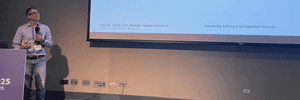Sometime while I was in graduate school, I started using the notion window manager. (Actually, at the time, I think it was ion3.) Notion is a tiling window manager that is geared towards keyboard usage instead of mouse usage. But let's be honest: I've been using notion for so long that I simply prefer it over anything else.
Notion, like most minor window managers, is a bit spartan. It does not provide
a desktop environment. It really just manages windows. There are some
features of a desktop environment that I don't need, such as a launcher. I know
all the commands that I use; I don't need a GUI to list them for me. But it's
often the little things that get you, such as locking the screen, or using the
media keys on your keyboard to adjust the volume. I used to be (more of) a hardcore nerd
and relished in my ability to craft a super-complex .xsessionrc file with all
kinds of bells, whistles and utilities connected as if with duct tape. But as I
grow older, sometimes I just want my computer to work.
For a long while now, I've found that running notion alongside GNOME for "desktop stuff" to work pretty well. For a long time, I followed an old Wiki post about how to combine GNOME with Awesome WM. This worked really welll with GNOME 2.
Many people say that you can't use GNOME 3 with window managers other than GNOME
Shell. I've actually had pretty good luck copying the Ubuntu gnome-session and
replacing Gnome Shell with notion. The above Awesome WM Wiki also shows how to
do it. Unfortunately, I've found that some features do not work, such as the
keyboard media keys, much to my dismay. Do media keys matter that much? Yes,
yes, they do. This apparently broke when GNOME Shell started binding the media
keys instead of gnome-settings-daemon. There
used to be a gnome-fallback-media-keys-helper utility around that would
simulate this behavior, but it seems to have disappeared.
As I was trying to fix this problem, I came across a blog post and an unrelated but similar github repo both describing how to use the i3 window manager with GNOME. TLDR: GNOME Flashback is a still supported variant of GNOME that is explicitly designed to support third-party window managers. Whereas GNOME Shell incorporates both the window manager and other stuff such as handling media keys, GNOME Flashback has the "other stuff" in a separate component that is designed to be used with a window manager such as metacity. But it works just fine with notion! Best of all, both my media keys and screen locking work. Hurray!
Because I hate setting up stuff like this, I've actually been hard at work packaging up my Linux computer configuration into reusable ansible components. It takes a little longer than doing it manually of course, but it's not too bad and it's pretty easy to read. I'm making my notion role available here in case anyone wants to try out my setup. Most of the logic is here if you are curious what is involved. Below are a few snippets to show how Ansible makes it relatively easy to manipulate configuration files.
# Same thing, but for gnome-flashback
- name: Copy gnome-flashback-metacity.session to notion-gnome-flashback.session
copy:
src: /usr/share/gnome-session/sessions/gnome-flashback-metacity.session
dest: /usr/share/gnome-session/sessions/notion-gnome-flashback.session
- name: 'notion-gnome-flashback.session: Change metacity to notion and add stalonetray'
replace:
path: /usr/share/gnome-session/sessions/notion-gnome-flashback.session
regexp: 'metacity'
replace: notion;stalonetray
- name: 'notion-gnome-flashback.session: Remove gnome-panel'
replace:
path: /usr/share/gnome-session/sessions/notion-gnome-flashback.session
regexp: ';gnome-panel'
- name: Symlink systemd target for notion-gnome-flashback session to gnome-flashback-metacity session
file:
src: /usr/lib/systemd/user/gnome-session@gnome-flashback-metacity.target.d
dest: /usr/lib/systemd/user/gnome-session@notion-gnome-flashback.target.d
state: link
- name: Install gconf override for notion-gnome-flashback
copy:
src: notion-gnome-flashback.gschema.override
dest: /usr/share/glib-2.0/schemas/01_notion-gnome-flashback.gschema.override
notify: Compile glib schemas- name: Set META
lineinfile:
path: /usr/local/etc/notion/cfg_notion.lua
regexp: '^--META='
line: META="Mod4+"
backup: true
- name: Set ALTMETA
lineinfile:
path: /usr/local/etc/notion/cfg_notion.lua
regexp: '^--ALTMETA='
line: ALTMETA="Mod1+"
backup: true
- name: Disable mod_dock
lineinfile:
path: /usr/local/etc/notion/cfg_defaults.lua
state: absent
line: 'dopath("mod_dock")'
backup: true
- name: Enable mod_statusbar
lineinfile:
path: /usr/local/etc/notion/cfg_notion.lua
regexp: '^--dopath("mod_statusbar")'
line: 'dopath("mod_statusbar")'
backup: truePowered with by Gatsby 5.0

